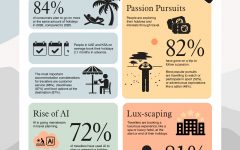 Ernesto Sanchez Beaumont, Managing Director, Amadeus Gulf shares insights on how technology has become key to post pandemic travel recovery. After a turbulent two years due to the COVID-19 pandemic, the appetite for traveling is accelerating, according to recent research by travel technology company Amadeus, with 50% of travelers expecting to have taken a business flight by the end of 2021. The Rebuild Travel survey, which surveyed consumers across the UAE, France, Germany, India, Spain, Russia, Singapore, the UK, and the US, shows the need for human connection has not been dampened by the turmoil of the last two years.
Ernesto Sanchez Beaumont, Managing Director, Amadeus Gulf shares insights on how technology has become key to post pandemic travel recovery. After a turbulent two years due to the COVID-19 pandemic, the appetite for traveling is accelerating, according to recent research by travel technology company Amadeus, with 50% of travelers expecting to have taken a business flight by the end of 2021. The Rebuild Travel survey, which surveyed consumers across the UAE, France, Germany, India, Spain, Russia, Singapore, the UK, and the US, shows the need for human connection has not been dampened by the turmoil of the last two years.
In fact, our “Rebuilding Hospitality: Trends in Demand, Data and Technology That are Driving Recovery” study showed global hotel occupancy increased to 60% in July 2021, nearly doubling 2020’s performance for the same month. These numbers mean that global hospitality occupancy had climbed 80% of the way back to pre-pandemic norms of around 75% for the first half of the year. For instance, the UAE registered a 62% hotel occupancy rate in the first half of the year, according to government figures
That being said, traveler concerns still exist around issues such as last-minute cancellations and refunds, for example. There is also a growing demand for apps and solutions where digital health data and travel information can be stored in one place for convenience.
Digital transformation
Technology plays a prominent role in combatting these concerns, particularly touchless experiences across the customer journey. Eighty per cent of travelers said technology – specifically, touchless technologies – would increase their confidence to fly. Ideally, it would reduce queues and congestion in public spaces and face-to-face/physical contact. More than half (56%) of the travelers surveyed said they would be comfortable using biometric facial recognition technology at boarding gates.
Research also reveals a massive shift in how people view the use of their data, with 93% of travelers saying they would be willing to provide personal data to enable the effective use of digital health passports or certificates. The current figure continues a trend that emerged in the immediate post-pandemic period, with 91% reacting positively to data collection in February 2021. Additionally, almost half of business travelers would be willing to provide their health data to visit a conference or event.
These figures are a significant game-changer. Travellers have shifted their attitude towards sharing their data or using biometrics post-pandemic, which opens a whole new world of opportunities moving forward while putting the onus on the travel industry players to raise the bar on accelerating the digitalization of the customer experience. Luckily, the smartphone has massively lowered the entry barrier for digitization with a ready-made platform that customers are familiar with and are comfortable using. Mobile apps that provide on-trip notifications and alerts, self-service check-in, and contactless mobile payments (e.g., Apple or Google Pay), mobile boarding and automated and flexible cancellation policies can create a truly seamless travel experience that will boost traveler confidence.
These developments offer a model that reinforces travelers’ trust and confidence to take to the skies in greater numbers again.
Sustainability
The pandemic has also changed the narrative towards sustainable travel. Well over 2 in 5 (46%) travelers surveyed believe greater availability or accessibility to green modes of transport, e.g., electric planes/trains will help the industry to become more sustainable in the long term.
More recently, the travel industry was under the spotlight at the COP26 conference in Glasgow, focused on how the travel industry can contribute towards global decarbonization efforts to help address climate change. The United Nations World Tourism Organization launched the ‘Glasgow Declaration for Climate Action in Tourism’ at the event, promptly adopted by some of tourism’s most prominent businesses. The 300 industry players have committed to cut emissions in half by 2030 and achieve Net Zero by 2050 at the latest.
Developments in Scotland align with prevailing public attitudes towards the environment. Nearly half of travelers believe making sustainable travel more cost-effective would be beneficial. Therefore, implementing green technology solutions can accelerate the path towards a more sustainable future.
As the industry comes together to make this happen, embracing technology to help travelers get back in the air again will create the confidence to travel safely, efficiently and sustainably.
 Tourism Breaking News
Tourism Breaking News


